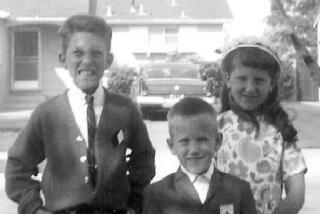‘City Person’ Is Both Attracted, Repelled by Moving Out
- Share via
NEW YORK — “My God, the suburbs!” John Cheever once wrote. “They encircled the city like enemy territory and we thought of them as a loss of privacy, a cesspool of conformity and a life of indescribable dreariness in some split-level village.”
Cheever’s essay, “Moving Out,” described his wrenching decision to move his family from a Manhattan apartment to a house in Westchester County in the late 1940s.
Four decades later, Esther Renzer is in the same spot.
She and her husband, David, are preparing to sell their co-op apartment in Brooklyn and move to one of two suburban areas: northern New Jersey if David’s career keeps him in New York or Southern California if it takes him there.
Esther knows that the suburbs will be cleaner, quieter and safer, especially for her 2-year-old daughter, Sabrina. But Esther is worried.
“I feel more alive in the city,” she said. “It’s almost as if I breathe differently. I’ve become a city person.”
As a businesswoman, “closet writer” and people-watcher, Esther finds inspiration in the city. As a marketer, “my finger has to be on the pulse of whatever will motivate sales,” she said. “In the city you’re more aware of that. It’s where trends start.”
When Cheever moved out, he missed the French-speaking panhandler who used to work Beekman Place; the Central Park Zoo lion house at 4 p.m. on February afternoons; a bagpiper on the Lexington Avenue subway platform who played a Black Watch march between trains.
When she moves, Esther will miss Prospect Park, the Brooklyn Botanic Garden, the old Russian immigrants who sit on benches in her neighborhood and cluck over Sabrina. She’ll even miss the F train.
In the city, she said, Sabrina “has been exposed to museums, restaurants, different kinds of people. I’m afraid of raising her in too sterile an environment.”
That is, the suburbs.
That is where Esther, now on the verge of 30, was once a shy, unappreciated teen-ager. “Moving almost represents going back to what I was there,” she said.
Some of her reluctance also hinges on what she is afraid may be a woman’s role in the suburban order.
“I don’t want to live like ‘The Stepford Wives,’ ” she said, referring to a film in which suburban women were like robots. “I don’t want to be concerned just about my house and my family, and I don’t want to have to spend all my time driving around. I like street life.”
Despite his wife’s misgivings and the longer commute to his Manhattan office, David Renzer welcomes the move. He is tired of city noise and pollution and looks forward to relaxing in his own house and yard after a hard day. And both parents think life will be better for Sabrina.
“When she’s older, I couldn’t let her out alone in the city to ride her bike,” Esther said. “There’s just too many stories.”
The Renzers considered moving to Manhattan or buying a weekend house in the country. But prices led them to the suburbs. “You get more space for your money,” Esther said, shrugging.
She can take heart from Cheever, who became the chronicler of suburbia and one of its greatest fans. He enjoyed being able “to shout in anger or joy without having someone pound on the radiator for silence,” and not having to tip a building staff of 20 at Christmas.
“The truth is, I’m crazy about the suburbs,” he wrote a decade after moving out, “and I don’t care who knows it.”


